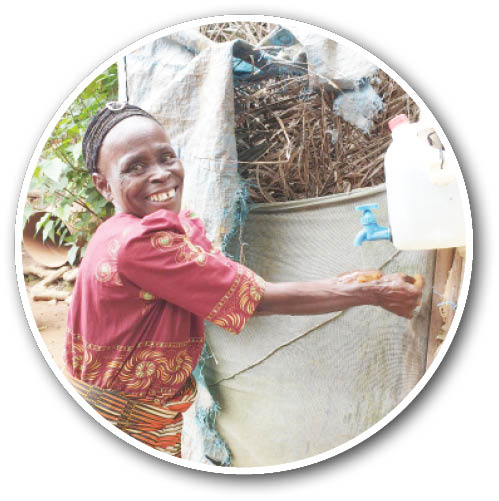Rural women as catalysts to promote safe hygiene and end open defecation in Nigeria
As the sun sets behind the hills of Oke Aladie village, one of the first communities certified as open defecation free (ODF) in Nigeria, Simbiat Afolabi rises from her sitting position to address a group of women gathered for hygiene promotion sessions. Afolabi is one of the volunteer hygiene promoters trained by the Local Government […]

A member of Aladie community of Ifedayo LGA demonstrating hand-washing.
As the sun sets behind the hills of Oke Aladie village, one of the first communities certified as open defecation free (ODF) in Nigeria, Simbiat Afolabi rises from her sitting position to address a group of women gathered for hygiene promotion sessions.
Afolabi is one of the volunteer hygiene promoters trained by the Local Government Area (LGA) Water, Sanitation, and Hygiene (WASH) Department to promote safe hygiene behaviour in communities.
As a volunteer, her goal is to ensure that members of her community embrace safe hygiene practices as the norm.
“I don’t want us to go back to the times we used to defecate in the open and didn’t care about washing our hands after using the toilet or before cooking and eating,” Afolabi said.
Although her community has been declared ODF, efforts are still being put in to ensure that they maintain their ODF status. The WASH unit facilitators, with support from UNICEF, provide trainings on safe hygiene practices such as proper handwashing at critical times.
In Nigeria, about 50 percent of the population lives in rural areas. But this group of people are disproportionately served and have less access to WASH services than their counterparts in the urban areas.
According to the 2018 WASH National Outcome Routine Mapping (WASH-NORM) conducted by the Federal Ministry of Water Resources and National Bureau of Statistics with support from UNICEF, only 26 per cent of the rural population in Nigeria have access to basic water and sanitation services compared to 45 per cent in urban areas and 30 per cent of rural population practice open defecation compared to 11 per cent in urban areas.
Thus, those living in rural areas are about two times less likely to access basic water and sanitation services and are three times more likely to defecate in the open than those in urban areas.
If Nigeria is to end open defecation by 2025 and meet the SDGs on water and sanitation by 2030, attention must be given to improving access to WASH services in rural communities.
With the adoption of the ‘Clean Nigeria: Use the Toilet’ campaign by the government in May 2019, the momentum to revitalize the WASH sector is growing. UNICEF, through the support of the European Union, DFID and DGIS, is supporting many rural communities to tackle issues related to open defection and poor sanitation and hygiene practices.
Like Afolabi, these women serve as volunteer hygiene promoters, community influencers, toilet business owners, and key Adashe (community local savings and loans group) and WASH Committee members, who have supported many communities to end open defecation.
With support from UNICEF, eight LGAs (out of 13 ODF LGAs) and over 18,000 communities have attained their ODF status, and the proportion of improved latrines has increased from 40 to over 60 percent since 2016.
Narrowing down to Oke Aladie village, all households now own and use latrine and practice safe hygiene and handwashing at critical times as a result of the influence of women who are amongst the key community leaders that lead the Community-Led Total Sanitation with Sanitation Marketing and Financing (CLTS++) process.
While these may be early days in the journey to an ODF Nigeria, lessons from women in Oke Aladie village who are driven by their passion to see their communities become ODF is a beacon of hope for the country.
Engaging women in CLTS++ processes such as toilet business owners, WASH entrepreneurs, sanitation or hygiene officers, WASH facility caretakers, amongst other activities, has played vital role in boosting community ownership of WASH services and women empowerment.
